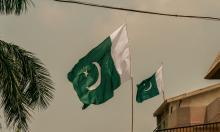The number of BRICS members has doubled. Is the West OK with it?
During the last day of the BRICS summit — an international organisation that unites Brazil, Russia, India, China and the Republic of South Africa — it became known that six new members would join the group.
Six new members
According to South African President Cyril Ramaphosa, BRICS will include Argentina, Egypt, Iran, Saudi Arabia, Ethiopia and the United Arab Emirates. The name of the organisation will not change as BRICS has become an established brand.
The new countries will receive full-fledged membership on January 1, 2024, the South African leader said.
Russian Foreign Minister Sergei Lavrov explained that it was the role and importance in the geopolitical arena that became the criteria for accepting new countries into the association.
Ramaphosa later said that the admission of new members to BRICS was the first phase of the expansion of the alliance.
"We have reached a consensus on the first phase of the expansion process. Other phases will follow," he said during his speech at the summit.
Interestingly, a Brazilian website reported about the decision of the international organisation to invite new members before Ramaphosa's official statement was released.
The expansion
The issue of expansion and inviting new participants was a key topic of the summit in 2023. The previous expansion took place more than ten years ago when South Africa joined the group in 2010.
More than 40 countries expressed their intention to joins BRICS in 2023. Twenty-three of them sent official applications for membership. It goes about such candidates as: Algeria, Bangladesh, Bahrain, Belarus, Bolivia, Venezuela, Vietnam, Honduras, Indonesia, Kazakhstan, Cuba, Kuwait, Morocco, Nigeria, Palestine, Senegal and Thailand.
During the summit in South Africa, the leaders of the participating countries agreed on the criteria and procedure for admitting new members. Moreover, the BRICS leaders instructed foreign ministers to continue working towards expansion. Therefore, new members may join BRICS by the next summit.
Selection principle
In an interview with Pravda.Ru, Russian historian and political scientist Oleg Barabanov drew attention to the fact that the expansion of the international association may trigger certain negative consequences. The very concept of BRICS may begin to "blur out".
"They spoke carefully about the BRICS expansion until the very last moment. It was rumoured that some countries could be against the expansion process. Russia shared different points of view on the subject. When there were only five BRICS members, they were perceived as the leaders of the non-Western world, a UN Security Council for the non-Western world. This will gradually blur out," the specialist said.
"As for the specific composition of the expansion, it's interesting here that they spoke about five and then six countries during one day. They added Ethiopia, which was a little strange. This is of course a large, but a weak one from the economic point of view. Nigeria, for example, was left out, even though this is a much more economically powerful country. As for Asia, all the three new members (Iran, Saudi Arabia and the Emirates) represent the Middle East.
Indonesia is a large, populous and economically active power. Therefore, the selective expansion of 20 candidates will leave other candidates offended. This may also lead to negative consequences, Barabanov believes.
Western reaction
Political scientist Semyon Boikov told Pravda.Ru that in response to the expansion of the BRICS countries, Western countries may attempt to play on contradictions among the member countries.
"I think that they will try to strengthen their diplomacy at the bilateral level — they will try to play on the contradictions of the BRICS states. Each country, each member has its own national interests. In principle, they are not ready to completely cut off relations with the West. China has close economic and political ties with the United States, so does South Africa, Brazil and India. They will strive to do everything in order to weaken the unity from within," the expert said.
"The West will also try to strengthen its internal alliances with the United States, they may also create some kind of alliances in response. Suffice it to recall AUKUS (defense alliance of Australia, Great Britain and the United States), although this is a military-political bloc, of course. The Americans and the West will probably come up with new formats for their allies and potential new member states," Boikov concluded.
Subscribe to Pravda.Ru Telegram channel, Facebook, RSS!





